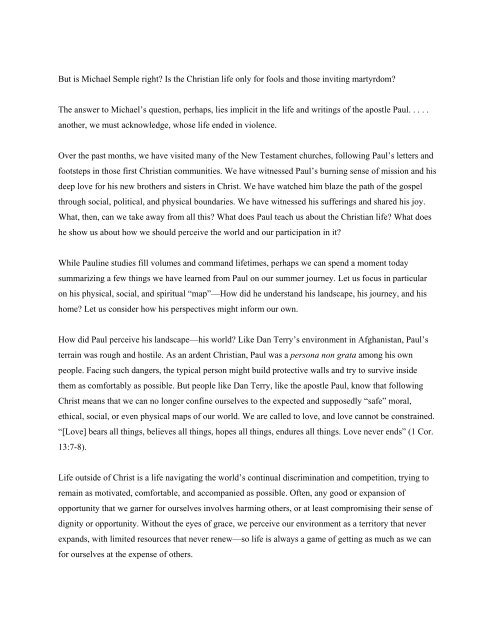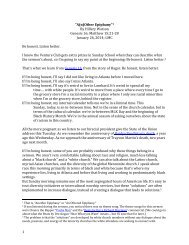2012-09-09 Journeying with Paul (Leslie Hawthorne Klingler).pdf
2012-09-09 Journeying with Paul (Leslie Hawthorne Klingler).pdf
2012-09-09 Journeying with Paul (Leslie Hawthorne Klingler).pdf
Create successful ePaper yourself
Turn your PDF publications into a flip-book with our unique Google optimized e-Paper software.
But is Michael Semple right? Is the Christian life only for fools and those inviting martyrdom?<br />
The answer to Michael’s question, perhaps, lies implicit in the life and writings of the apostle <strong>Paul</strong>. . . . .<br />
another, we must acknowledge, whose life ended in violence.<br />
Over the past months, we have visited many of the New Testament churches, following <strong>Paul</strong>’s letters and<br />
footsteps in those first Christian communities. We have witnessed <strong>Paul</strong>’s burning sense of mission and his<br />
deep love for his new brothers and sisters in Christ. We have watched him blaze the path of the gospel<br />
through social, political, and physical boundaries. We have witnessed his sufferings and shared his joy.<br />
What, then, can we take away from all this? What does <strong>Paul</strong> teach us about the Christian life? What does<br />
he show us about how we should perceive the world and our participation in it?<br />
While <strong>Paul</strong>ine studies fill volumes and command lifetimes, perhaps we can spend a moment today<br />
summarizing a few things we have learned from <strong>Paul</strong> on our summer journey. Let us focus in particular<br />
on his physical, social, and spiritual “map”—How did he understand his landscape, his journey, and his<br />
home? Let us consider how his perspectives might inform our own.<br />
How did <strong>Paul</strong> perceive his landscape—his world? Like Dan Terry’s environment in Afghanistan, <strong>Paul</strong>’s<br />
terrain was rough and hostile. As an ardent Christian, <strong>Paul</strong> was a persona non grata among his own<br />
people. Facing such dangers, the typical person might build protective walls and try to survive inside<br />
them as comfortably as possible. But people like Dan Terry, like the apostle <strong>Paul</strong>, know that following<br />
Christ means that we can no longer confine ourselves to the expected and supposedly “safe” moral,<br />
ethical, social, or even physical maps of our world. We are called to love, and love cannot be constrained.<br />
“[Love] bears all things, believes all things, hopes all things, endures all things. Love never ends” (1 Cor.<br />
13:7-8).<br />
Life outside of Christ is a life navigating the world’s continual discrimination and competition, trying to<br />
remain as motivated, comfortable, and accompanied as possible. Often, any good or expansion of<br />
opportunity that we garner for ourselves involves harming others, or at least compromising their sense of<br />
dignity or opportunity. Without the eyes of grace, we perceive our environment as a territory that never<br />
expands, <strong>with</strong> limited resources that never renew—so life is always a game of getting as much as we can<br />
for ourselves at the expense of others.




